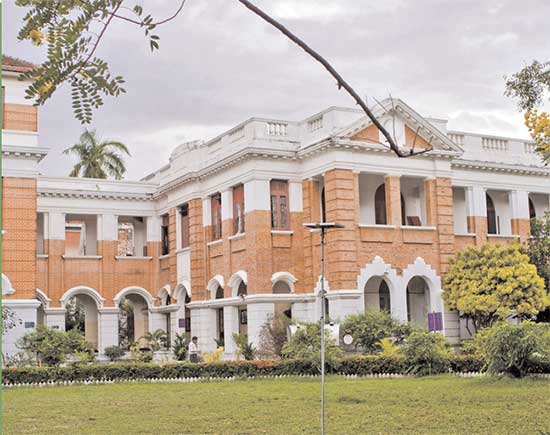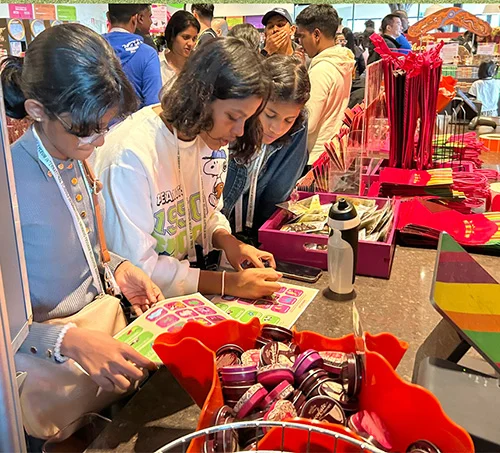Features
First Leaping Wolves

Among the interesting articles on diverse subjects in The Island of Saturday 22 August 2020 was a fascinating contribution on the history of the Scout Movement in Sri Lanka. Among the wealth of detail presented was the contribution from Ceylon in the early years of the last century to the Scouting Movement in India (viz. by Gordon Pearce and Vincent Mendis). We must be grateful to ‘Ruhunu Putra’ for making this record available to the general public. It is especially valuable as the values inculcated by Scouting are solely needed in the world we live in.
When this contributor was a pupil at Royal Primary School, he was a member of the Royal Primary Wolf Cubs Pack. This was a group which was complete in itself but also prepared one to join the Royal College Boy Scouts Troop in due course. The Master-in-Charge of the Royal Primary Wolf Cubs Pack was Captain Vernon Halpe. Captain Halpe was devoted to the Scout Movement and spared no pains in developing his Pack of Wolf Cubs.
In 1953, the Royal Primary Wolf Cubs Pack had the honour of being the first in Ceylon to produce Leaping Wolves, the highest distinction awarded to Wolf Cubs for achievements. Three cubs qualified on the same day to become Leaping Wolves. The first two were Dudley Halpe and this writer. The honour was shared equally since the final of a series of qualifications was in sending messages by means of Semaphore, where communications are transmitted using flags from the ‘sender’ to the ‘receiver’. In this instance, Dudley first sent a message to myself and then the roles were reversed. (Dudley Halpe’s brother, Ashley, was in later life the distinguished Professor at Peradeniya.) The third Leaping Wolf was D.C.Amerasinghe, who was tested by Captain Halpe.
The investiture of the distinction of ‘Leaping Wolf’ to the above three awardees was performed in Colombo in 1953 by F. H. J. Dahly, Headquarters Commissioner.
To conclude, it may be noted that a knowledge of Semaphore by today’s youth should be encouraged to meet situations where a breakdown of public electricity supplies will render inoperable the sending of information by email etc.!
–Dr. Rohan H Wickramasinghe
Features
‘Silent Majority’ abandoned to Long-suffering in regional conflicts

 With reports emerging that India has attacked some ‘sites’ in Pakistan and Pakistan-administered Kashmir, the question could be posed whether the stage has just been set for yet another costly India-Pakistan military conflict. Sensible opinion in South Asia could only hope that wise counsel would sooner rather than later come to prevail on both sides of the divide and that they would draw back from the brink of full-scale war.
With reports emerging that India has attacked some ‘sites’ in Pakistan and Pakistan-administered Kashmir, the question could be posed whether the stage has just been set for yet another costly India-Pakistan military conflict. Sensible opinion in South Asia could only hope that wise counsel would sooner rather than later come to prevail on both sides of the divide and that they would draw back from the brink of full-scale war.
The states concerned ought to know fully well the possible wide-ranging weighty consequences of another regional conflict. It should be plain to see that it would benefit none in the two theatres of confrontation, most particularly the relevant publics or the ‘Silent Majority’.
In fact, in connection with the mentioned initial military attacks, the Pakistani side has gone on record that some civilian lives have been lost. Such losses could burgeon in the event of full scale hostilities. These costs could of course be staggering and unimaginable in the event the nuclear option is resorted to by the sides, going forward.
Accordingly, the hope of the peace-loving world-wide is likely to be that India and Pakistan would give negotiations a chance and resolve their differences peacefully. It would be in the best interests of the world for the champions of peace to join their voices to that of UN chief Antonio Guterres and call on the sides to negotiate an end to their differences.
The utter helplessness and misery of the people of the Gaza ought to drive home afresh the horrors of war. Currently the news is that the Gazans are literally starving to death. Food and other essentials provided by UN agencies are reportedly being prevented by Israel from getting to the hapless people of Gaza. So dire is their situation that concerned quarters are calling on the compassionate worldwide to provide the Gazans with food, water and other essentials voluntarily. This SOS would need to be heeded forthwith.
Accordingly, it could be inferred that most formal arrangements, including those that are generally under the purview of the UN, geared to providing emergency humanitarian assistance to the needy, have, for all intents and purposes, been rendered ineffective in the Gaza. The UN cannot be faulted for this state of things; rather, Israel should be held accountable in the main for it.
The matter of accountability is central to the dramatic slide into lawlessness the world has been experiencing over the past few decades. As could be seen, International Law is no longer fully applicable in the conflict and war zones of the world because it is not being adhered to by many state and non-state aggressors. That the UN is hapless in the face of such lawlessness is plain to see.
We have of course the Middle East wherein International Law has fallen silent for quite a while. How could it be otherwise, when Israeli aggressions are being winked at by the US, for which the policy of backing Israel is almost sacrosanct?
Moreover, under President Donald Trump, it is difficult to see the US changing policy course on the Middle East. Trump made vague promises of bringing peace to the region in the run-up to his reelection but has done nothing concrete by way of peace-making. Consequently, complete lawlessness prevails in the Middle East. US policy towards Israel counts as another example of how the self- interest of US central administrations blinds them to their international obligations, in this case Middle East peace.
However, the commentator could be criticized as being biased if he holds only Israel responsible for what has befallen the Middle East. It has been the position of this columnist that Israel’s security needs should be taken cognizance of by its state and non-state adversaries in the Middle East and acted upon if the basis is to be laid for a durable Middle East peace. Inasmuch as Palestinian statehood must be guaranteed, the same should be seen as applicable to Israel. The latter too enjoys the right to live in a secure state of its own, unopposed by its neighbours.
The Ukraine of today is also sad testimony to the ill consequences of powerful, aggressor states wantonly disregarding International Law and its obligations. Nothing could justify Russia in invading Ukraine and subjecting it to a condition of Longsuffering. Clearly, Ukraine’s sovereignty has been violated and such excesses go to the heart of the current state of ‘International Disorder’. Of course the same stricture applies to the US in relation to its military misadventures in Afghanistan and Iraq, to name just two such modern examples.
There is no ducking the fact, then, that civilian publics in the mentioned theatres of war and outside, are being subjected to the worst suffering as a consequence of the big powers’ self-aggrandizement schemes and military misadventures. Longsuffering becomes the tragic lot of the people who have nothing to do with such unbridled power ambitions.
One would not be exaggerating the case if he states that civilian publics count for almost nothing in the present ‘International Disorder’. Increasingly it is becoming evident that from the viewpoint of the big powers and authoritarian governments the people are of little or no importance. Considering that self-aggrandizement is of the paramount interest for the former the public interest is coming to be seen as inconsequential.
Consequently, not much of a case could be made currently for the once almost reverentially spoken of ‘Social Contract’. For, the public interest does not count for much in the scrambles for power among the major powers who are seen at the popular level as the principal history-makers.
It is in view of the above that much is expected of India. Today the latter is a ‘Swing State’ of the first importance. Besides being a major democracy, it is one of the world’s principal economic and military powers. It possesses abundant potential to help to put things right in international politics. If there is one state in Asia that could help in restoring respect for International Law, it is India.
Considering the above, India, one believes, is obliged to bear the responsibility of keeping South Asia free of any more long-running, wasting wars that could aggravate the material hardships and socio-economic blights of the region. Thus, India would need to consider it imperative to negotiating peace with Pakistan.
Features
Memorable happening … Down Under

 Under the Global-Ise Australia Advanced Sports Development Programme, a delegation of 15 swimmers from Lyceum International School, Wattala, had the remarkable opportunity to train and experience high-performance sports development in Melbourne, Australia.
Under the Global-Ise Australia Advanced Sports Development Programme, a delegation of 15 swimmers from Lyceum International School, Wattala, had the remarkable opportunity to train and experience high-performance sports development in Melbourne, Australia.
The 10-day programme was carefully curated to offer intensive training, educational exposure, and cultural experiences for the young athletes.
The swimmers underwent specialised training through Swimming Victoria’s elite programme, held at some of Melbourne’s premier aquatic facilities.

Visit to Victorian Parliament
Each day began as early as 5:00 a.m. and continued until 7:00 p.m., ensuring a rigorous and enriching schedule that mirrored the standards of international competitive swimming.
Beyond training, the programme offered a wide array of experiences to broaden the students’ horizons.

Morning training
The tour group explored iconic landmarks such as the Victorian Parliament and the Melbourne Cricket Ground (MCG), and enjoyed shopping at Chadstone – The Fashion Capital. They also experienced the natural beauty of Victoria with visits to Yarra Valley Chocolaterie & Ice Creamery, and Cardinia Reservoir Park, where they observed kangaroos in their natural habitat.
An academic highlight of the tour was the group’s exclusive visits to three of Australia’s leading universities: the University of Melbourne, Monash University, and Deakin University. These visits aimed to inspire students and showcase the vast educational opportunities available in Australia.

Checking out the scene at Yarra Valley Chocolaterie & Ice Creamery
As part of the cultural immersion, Global-Ise hosted a traditional Australian BBQ at the Tim Neville Arboretum in Ferntree Gully. The students also enjoyed a variety of diverse culinary experiences each evening, further enriching their understanding of local and international food cultures.
The tour concluded with a celebratory dinner at the Spicy Wicket Restaurant, where each participant received a presentation in recognition of their involvement.

Enjoying an Aussie BBQ for lunch
The evening was made especially memorable by the presence of Pradeepa Saram, Consul General of Sri Lanka in Victoria.
Global-Ise Management—Ken Jacobs, Johann Jayasinha, and Dr Luckmika Perera (Consultant from the University of Melbourne)—did a magnificent job in planning and the execution of the advanced sports programme.

Coaches from Sri Lanka presenting a plaque to Global-Ise Management team
Ken Jacobs (centre), Johann Jayasinha, and Dr Luckmika Perera (on the right
Features
Bright, Smooth Skin

 Hi! How’s the beauty scene keeping with you?
Hi! How’s the beauty scene keeping with you?
Phew, this heat is awful but there is nothing that we can do about it.
However, there are ways and means to take care of your skin and I will do my best to help you in every way I can.
Well, this week, let’s go for a Bright, Smooth Skin.
Gram flour (also known as besan) is a traditional skincare ingredient known for its:
* Natural exfoliating properties.
* Ability to absorb excess oil.
* Gentle brightening and tan-removal effects.
* Suitability for all skin types, especially oily and acne-prone skin.
You will need 01–02 tablespoons gram flour (besan) and rose water, or raw milk, to make a paste.
You could add the following two as optional add-ins: A pinch of turmeric (for extra glow), and a few drops of lemon juice (for oily skin and pigmentation)
Add the gram flour to a small bowl and mix in the rose water (for oily/sensitive skin) or raw milk (for dry skin) slowly.
Stir well to make a smooth, spreadable paste—not too thick, not too runny.
Now apply this mixture, evenly, to your damp face and neck, and let it sit for 5–10 minutes (don’t let it dry completely if you have dry skin).
Gently massage in circular motions using wet fingers—this helps exfoliate.
Rinse off with lukewarm water, and then pat your skin dry.
Use it 02–03 times a week for best results.
Skin Benefits:
* Removes dirt, sweat, and oil without stripping natural moisture.
* Gently exfoliates dead skin cells, revealing smoother skin.
* Brightens the complexion and fades mild tanning.
* Helps clear clogged pores and reduce pimples.
* Leaves skin fresh and glowing—perfect for humid climates.
-

 News7 days ago
News7 days agoRanil’s Chief Security Officer transferred to KKS
-

 Opinion5 days ago
Opinion5 days agoRemembering Dr. Samuel Mathew: A Heart that Healed Countless Lives
-

 Business3 days ago
Business3 days agoAitken Spence Travels continues its leadership as the only Travelife-Certified DMC in Sri Lanka
-

 Business3 days ago
Business3 days agoLinearSix and InsureMO® expand partnership
-

 Latest News2 days ago
Latest News2 days agoNPP win Maharagama Urban Council
-

 Business7 days ago
Business7 days agoCCPI in April 2025 signals a further easing of deflationary conditions
-

 Features5 days ago
Features5 days agoTrump’s economic missiles are boomeranging
-

 Features7 days ago
Features7 days agoExpensive to die; worship fervour eclipses piety












